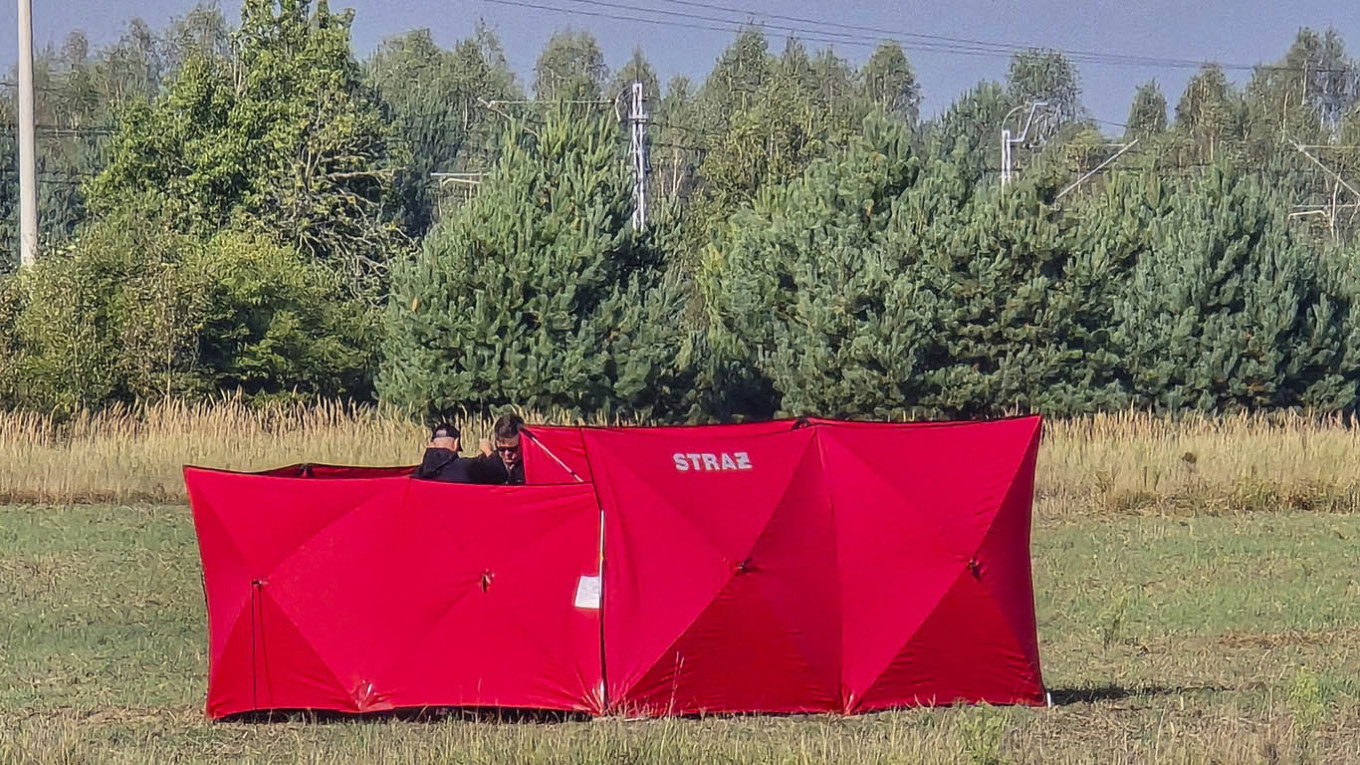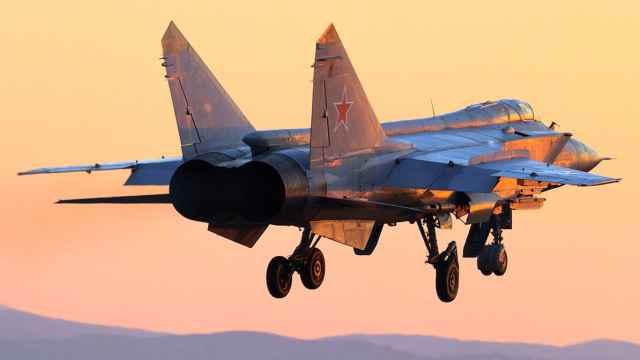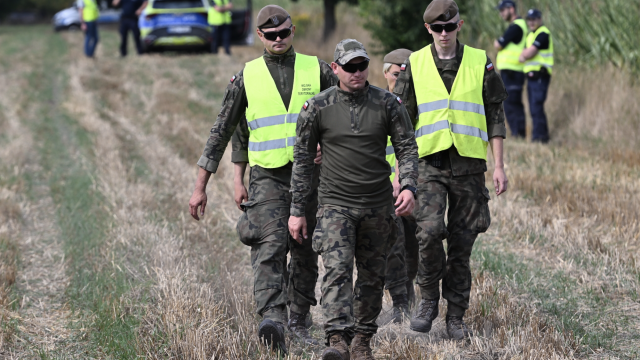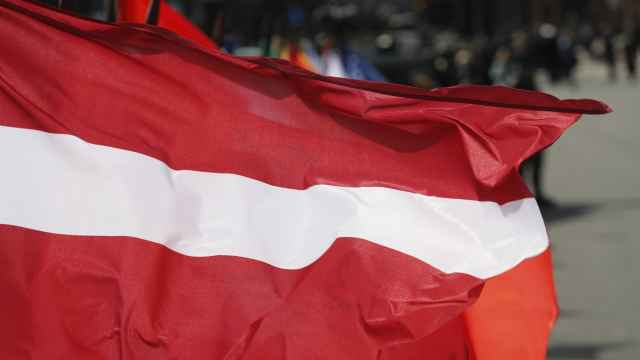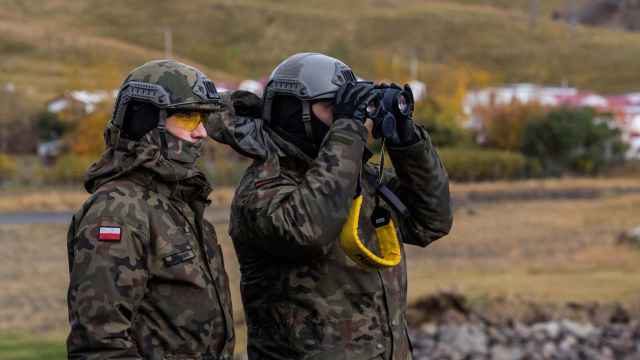NATO planes downed Russian drones after they entered Polish airspace during wider strikes on Ukraine on Wednesday, in the alliance’s first direct military engagement with Russia since Moscow launched its full-scale invasion in 2022.
Russia denied targeting Poland and accused Warsaw of spreading “myths” to escalate the war in Ukraine. But Western and Ukrainian political and military experts said that the incursion may have been a deliberate effort to test Western defenses and resolve.
“This incursion marks a significant escalation with potentially far-reaching implications not only for Poland, but for European security more broadly,” Tinatin Japaridze, an analyst with Eurasia Group, told The Moscow Times.
“By violating Polish airspace, Russia is clearly testing NATO’s defenses and seeking to expose any divisions within the alliance, particularly amid lingering questions about U.S. resolve,” she said.
Japaridze added that the incident underscores Moscow’s readiness to push boundaries and “exploit any perceived vulnerabilities along NATO’s eastern flank — even if Russia is currently not looking for a direct military confrontation with a NATO member state.”
Russian drones and missiles have crossed into the airspace of NATO members, including Poland, several times during Moscow’s three-and-a-half-year war, but no NATO country has until now attempted to shoot them down.
Warsaw said that at least three drones were shot down in Wednesday’s attack, which it described as “not an accidental event,” but no one was harmed.
The incident took place as Russia launched a series of strikes across Ukraine, including in the western city of Lviv, less than two hours’ drive from the Polish border.
Poland reported 19 violations of its airspace overnight. Reports said that the cities of Warsaw, Lublin and Rzeszów — a key logistics hub for delivering military and humanitarian aid to Ukraine — were potentially under threat from the Russian drone attacks.
NATO Secretary General Mark Rutte expressed “solidarity with Poland and denounced Russia’s reckless behavior” and called for the alliance to boost its defense spending and production and maintain its support for Kyiv.
As European capitals issued swift condemnations, several framed the incident as Russia testing Ukraine’s allies — especially at a time when Europe is taking the lead in providing aid to Ukraine for the first time since June 2022.
“What he wants to do is to test us,” said the EU’s top diplomat Kaja Kallas. “And every time he’s bolder, because he’s able to be bolder because our response hasn’t been strong enough.”
U.S. President Donald Trump, whose efforts to broker peace talks between Moscow and Kyiv this year have failed to yield results, gave a terse response to the attack.
“What’s with Russia violating Poland’s airspace with drones? Here we go!” he wrote on social media, without elaborating further.
The White House said that Trump would soon speak with his Polish counterpart Karol Nawrocki, a close nationalist ally who visited the Oval Office last week.
The intrusion came just days before Russia and its close ally Belarus, which both neighbor Poland, were set to begin their joint Zapad-2025 military drills.
On Tuesday, Warsaw announced it was closing its few remaining border crossings with Belarus over the Sept. 12-16 drills.
Following Wednesday’s drone incident, Minsk said its air defense forces had tracked and shot down several drones that “lost their course as a result of electronic warfare measures” during an overnight exchange of air attacks between Russia and Ukraine.
According to Ukrainian military expert Ivan Stupak, the drones that attacked Poland were likely not combat drones and may have been intended to deliberately fly into Polish territory to test its security systems.
Stupak, a former Ukrainian security services officer, told The Moscow Times that the attack may have allowed Russia to track the sequence of Poland’s radar responses and observe which aircraft were scrambled.
Kirill Shamiev, a policy fellow at the European Council on Foreign Relations, said that the attack “is a sign that this could escalate into a regular flow of ‘stray’ Russian drones made of wood and tape towards Polish and Baltic airports and other logistical hubs.”
“Moscow would then ‘offer’ a compromise: no Ukrainian interference in Russian civilian air traffic in exchange for ‘software updates’ to the drones,” Shamiev suggested, referring to intensified Ukrainian drone attacks on Russian soil, which have significantly disrupted operations at Russian airports.
“What is the strategy? To show that Moscow can significantly worsen the lives of Europeans without crossing the perceived threshold of radical military escalation while offering ‘concessions’ in exchange for European ‘understanding’ of Moscow’s interests in Ukraine,” Shamiev wrote in a social media post.
The Center for Eastern Studies in Warsaw also suggested that “the goal of Russia’s aggressive actions is to destabilize the internal situation in Poland and other Western countries supporting Kyiv” and “undermine the solidarity of its allies.”
Polish Prime Minister Donald Tusk said he invoked NATO’s Article 4, under which a member can call urgent talks when it feels its “territorial integrity, political independence or security” is at risk — only the eighth time the measure has been used.
Yet a senior NATO diplomat, speaking to AFP on condition of anonymity, said the response from NATO would probably be “shifting a few extra assets” to Poland or elsewhere in the east and pushing a “tough line” from the NATO secretary general.
Stupak said that, in addition to increasing aid to Ukraine, Europe could also direct resources toward strengthening military support for the Baltic states and Poland, adding that “it is difficult to say which path the Europeans will choose.”
Japaridze argued that “rather than diminishing Western support [to Ukraine], this incident will, in fact, likely further reinforce it.”
“Countries such as Poland, the Baltic states and the Czech Republic — which are among Ukraine’s strongest supporters — are expected to push for greater military and financial aid,” Japaridze told The Moscow Times.
AFP contributed reporting.
A Message from The Moscow Times:
Dear readers,
We are facing unprecedented challenges. Russia's Prosecutor General's Office has designated The Moscow Times as an "undesirable" organization, criminalizing our work and putting our staff at risk of prosecution. This follows our earlier unjust labeling as a "foreign agent."
These actions are direct attempts to silence independent journalism in Russia. The authorities claim our work "discredits the decisions of the Russian leadership." We see things differently: we strive to provide accurate, unbiased reporting on Russia.
We, the journalists of The Moscow Times, refuse to be silenced. But to continue our work, we need your help.
Your support, no matter how small, makes a world of difference. If you can, please support us monthly starting from just $2. It's quick to set up, and every contribution makes a significant impact.
By supporting The Moscow Times, you're defending open, independent journalism in the face of repression. Thank you for standing with us.
Remind me later.



